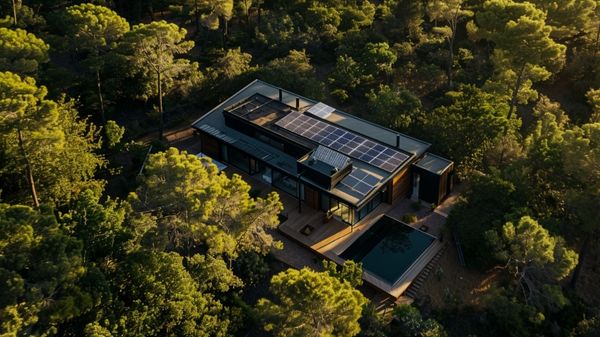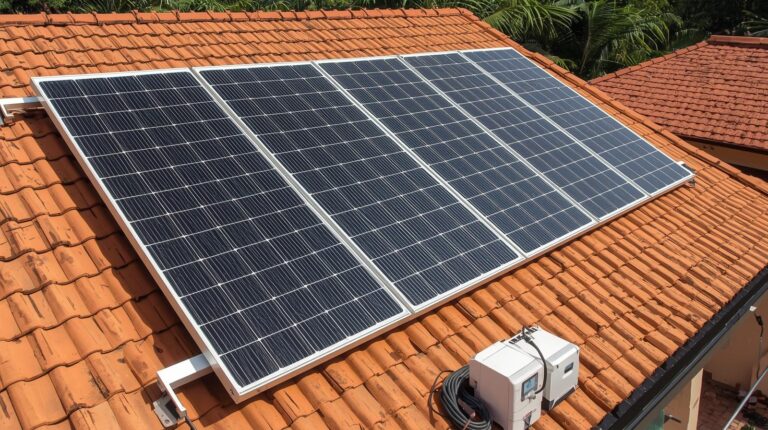To run a house off-grid, you generally require between 5 to 20 kilowatts (kW) to fulfill the energy demands of a standard household. Factors to contemplate include conducting an energy needs evaluation, optimizing appliance efficiency, and selecting renewable energy sources like solar panels and wind turbines.
HVAC and lighting choices, power storage solutions, and system monitoring also influence the kW needed for off-grid living. If you want to maintain an independent energy supply and efficiently power your home off-grid, evaluating your specific requirements and implementing energy-saving measures are crucial steps to contemplate.
Key Takeaways
- Assess total energy needs based on appliances and usage patterns.
- Consider renewable sources like solar panels and wind turbines.
- Optimize power storage with efficient battery types and management.
- Choose high SEER HVAC systems and LED lighting for efficiency.
- Regular monitoring and adjustments ensure off-grid system performance.
Energy Needs Assessment
To determine how many kilowatts (kW) you need to run a house off-grid, the first step is conducting an energy needs assessment.
By evaluating your energy usage requirements, you can pave the way towards energy liberation. Start by considering the energy efficiency of your home – are there ways to reduce energy consumption through insulation, efficient appliances, and smart practices?
Embracing renewable sources like solar panels and wind turbines can further elevate your energy independence.
Calculate the total energy consumption of your household appliances and electronics, noting their power ratings. This assessment empowers you to tailor your off-grid system to meet your specific needs, ensuring you generate enough electricity sustainably.
Liberation from the grid begins with understanding your energy needs and optimizing efficiency, all while harnessing the power of renewable sources. Additionally, consider the weather conditions in your area to gauge the solar energy potential for your off-grid system.
Appliance Power Consumption
Determining the power consumption of your household appliances is essential in understanding your energy needs for running a house off-grid. To optimize your off-grid setup, consider the following aspects related to appliance power consumption:
- Appliance Usage: Assess how frequently you use different appliances to estimate their impact on energy consumption.
- Energy Efficiency: Choose energy-efficient appliances with lower power ratings to reduce overall electricity demand.
- Standby Consumption: Be mindful of appliances that consume power even when not in use, affecting your off-grid energy reserves.
- Seasonal Variations: Account for seasonal changes in appliance usage patterns that may influence your energy requirements.
- Energy Audits: Conduct regular energy audits to identify power-hungry appliances and explore ways to minimize energy wastage, ensuring long-term savings and efficient energy usage.
- Device Compatibility: Ascertain your appliances are compatible with your off-grid system to prevent operational issues.
- Load Management: Strategically schedule appliance usage to balance energy consumption and maintain a stable off-grid power supply.
- Peak Demand: Consider peak demand times when selecting your inverter to handle surges in power requirements effectively.
Lighting Requirements
No products found.
When considering your off-grid setup, addressing your lighting requirements effectively is essential. Opting for LED lighting is paramount due to its energy efficiency, ensuring you maximize your power resources.
LED lights consume considerably less energy than traditional incandescent bulbs, making them ideal for off-grid living. Implementing lighting controls such as timers or motion sensors can further enhance energy savings by only illuminating spaces when needed.
Incorporating natural illumination into your home design can also reduce your reliance on artificial lighting during daylight hours. Smart lighting systems offer advanced control options, allowing you to adjust brightness levels remotely or schedule lighting based on your daily routine.
These systems can be integrated with renewable energy sources to optimize energy consumption. In addition, considering the use of solar-powered lights can further enhance your off-grid lighting efficiency.
HVAC System Considerations
- GE 5100 BTU MECHANICAL WINDOW AIR CONDITIONER: Designed to efficiently cool rooms up to 150 sq ft...
- BEST FOR SMALL ROOMS: This AC unit is the right size for delivering 5100 BTU cooling capacity to...
- LOW-NOISE OPERATION - Keep the cool air flowing with minimal disruption; ideal for nighttime use in...
Considering the climate and size of your off-grid home, selecting the right HVAC system is vital for maintaining comfortable temperatures efficiently.
When choosing an HVAC system, factors such as energy efficiency, climate considerations, installation costs, seasonal variations, unit sizing, smart thermostats, ductwork design, air quality, heat recovery, and system zoning play an important role.
Here is a breakdown of key considerations for your off-grid HVAC system:
| HVAC System Considerations | Details |
|---|---|
| Energy Efficiency | Opt for systems with high SEER ratings to save on energy. |
| Climate Considerations | Choose systems suitable for your specific climate. |
| Installation Costs | Consider upfront and long-term costs. |
| Seasonal Variations | Make sure the system can handle temperature fluctuations. |
| Unit Sizing | Proper sizing is important for efficiency and performance. |
| Smart Thermostats | Control temperature remotely for energy savings. |
| Ductwork Design | Well-designed ductwork improves efficiency. |
| Air Quality | Choose systems that enhance indoor air quality. |
Off-Grid Power Storage
- SPEED UP YOUR RECHARGEABILITY: It takes only 2 hours to recharge 80% battery of the power station...
- SAFE & STEADY POWER SUPPLY: Armed with a 293Wh lithium-ion battery pack, the Explorer 300 features...
- POWER YOUR EXPECTATIONS: Featuring 2* AC outlet, 1* PD 60W USB-C port (input/output supported...
When considering off-grid power storage for your house, it’s vital to explore various battery types that suit your needs. Understanding the capacity and efficiency of these batteries is essential to guarantee a reliable power supply. Additionally, maintaining and safeguarding the longevity of your off-grid power storage system will be key factors in its overall performance and cost-effectiveness.
Battery Types for Storage
To efficiently store power in an off-grid system, selecting the right battery type is essential. When evaluating battery types for off-grid power storage, you’ll come across two main options: lithium batteries and lead acid batteries.
Here are some key factors to take into account when choosing between the two:
- Battery Management: Lithium batteries typically have built-in battery management systems, while lead acid batteries require external management.
- Cycle Life: Lithium batteries have a longer cycle life compared to lead acid batteries.
- Depth of Discharge: Lithium batteries can withstand deeper discharges than lead acid batteries.
- Thermal Performance: Lithium batteries generally perform better in extreme temperatures.
- Charging Rates: Lithium batteries can be charged at higher rates than lead acid batteries.
- Environmental Impact: Lead acid batteries are more harmful to the environment compared to lithium batteries.
- Cost Comparison: While lithium batteries have a higher upfront cost, they may be more cost-effective in the long run due to their durability and efficiency.
- Installation Tips: Verify proper ventilation and follow manufacturer guidelines for installation to maximize battery performance.
Capacity and Efficiency
For ideal off-grid power storage, understanding the capacity and efficiency of your system is vital. When designing your off-grid power system, considering the capacity of your batteries and their efficiency in storing and releasing energy is essential for a reliable and sustainable setup.
Proper energy management guarantees that you have enough power when you need it and that your system runs effectively.
| Aspect | Description | Importance |
|---|---|---|
| System Design | Best layout and setup of components | Guarantees efficient energy flow |
| Capacity | Amount of energy the system can store | Determines available power |
| Efficiency | How well the system uses stored energy | Impacts overall performance |
| Energy Management | Monitoring and optimizing energy usage | Maximizes system effectiveness |
Maintenance and Longevity
Understanding the maintenance requirements and guaranteeing the longevity of your off-grid power storage system are key factors in keeping your setup operational and efficient over time.
To achieve this, consider implementing the following strategies:
- System Monitoring: Regularly check the performance of your power storage system to identify any issues promptly.
- Preventive Maintenance: Conduct routine inspections and maintenance to prevent breakdowns and maximize system lifespan.
- Seasonal Adjustments: Make necessary adjustments based on seasonal changes to enhance system performance.
- Equipment Upgrades: Stay updated with technology advancements and consider upgrading components for better efficiency.
- Performance Optimization: Continuously monitor and tweak settings to guarantee peak performance.
- Longevity Strategies: Implement measures to extend the lifespan of your power storage system.
Solar Panel Sizing
Determining the appropriate solar panel sizing for your off-grid house is essential for ensuring a reliable and sustainable power supply. When considering solar panel sizing, two important factors to keep in mind are solar panel efficiency and installation considerations.
Here’s what you need to know:
- Solar Panel Efficiency:
- Higher efficiency solar panels generate more electricity per square foot, maximizing power output.
- Look for panels with a high efficiency rating to make the most of limited roof space or land area.
- Installation Considerations:
- Assess the available space for solar panel installation on your property.
- Consider factors like shading, orientation, and tilt angle to optimize sunlight exposure.
- Consult with a professional to determine the ideal solar panel size based on your energy needs and location.
Wind Turbine Capacity
To complement your off-grid power supply strategy beyond solar panels, considering the capacity of a wind turbine can greatly enhance your energy production.
Wind turbines can be a valuable addition to your renewable energy mix, providing a consistent source of electricity. When evaluating wind turbine capacity, several factors come into play:
- Turbine Efficiency: Select a turbine with high efficiency to maximize power generation.
- Installation Considerations: Verify proper installation for ideal performance.
- Environmental Impact: Assess how the turbine may impact local wildlife and ecosystems.
- Noise Levels: Consider the noise produced by the turbine and its impact on surrounding areas.
- Site Assessment: Choose a location with strong and consistent wind patterns.
- Maintenance Requirements: Regular maintenance is essential for the turbine’s longevity.
- Grid Integration: Explore options for integrating wind power into your existing grid.
- Cost Analysis: Calculate the initial investment and long-term savings of incorporating a wind turbine into your off-grid system.
When selecting a wind turbine for off-grid use, it is crucial to consider the versatile applications to ensure optimal performance and energy generation.
Generator Backup Options
- Energize Almost Everything. The EcoFlow DELTA Pro 3 supports 120V/240V voltage and has a 4000W...
- Forget Refueling. Featuring a 4096Wh LFP battery capacity, expandable to 48kWh with extra batteries...
- Plug and Play. Experience hassle-free power with the DELTA Pro 3, a versatile portable power station...
Considering generator backup options is essential for guaranteeing a reliable off-grid power supply. When selecting a generator for backup power, several factors come into play to meet your needs effectively.
Start by calculating the appropriate generator sizing based on your power requirements. Choose fuel types such as gasoline, propane, or diesel, considering availability and storage capacity.
Opt for generators with lower noise levels for a quieter off-grid experience, and explore portable options for flexibility. Ascertain compatibility with your inverter selection to avoid compatibility issues.
Evaluate emissions impact for environmental consciousness and prioritize safety considerations during operation. Seek professional installation to secure proper setup and functionality. Additionally, ensure that the battery management system efficiency of the generator meets your requirements.
Conclusion
Ultimately, determining the KW needed to run a house off-grid involves a thorough assessment of energy needs, appliance power consumption, lighting requirements, HVAC system considerations, power storage options, solar panel sizing, wind turbine capacity, and generator backup choices.
It’s like solving a complex puzzle, with each piece contributing to the overall picture of sustainable and self-sufficient living. With careful planning and the right resources, running a house off-grid is not only possible but also rewarding in the long run.







